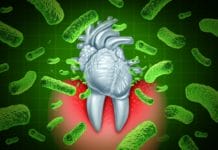Dental hygienists play an important role in nutritional counseling and screening for sleep apnea and airway issues. A recently published study offers new insight into the effects of diet on sleep. In the study conducted by Uppsala University, researchers explored the impact of high-fat/high-sugar vs. low-fat/low-sugar diets on sleep patterns. The study involved healthy participants who were given both a healthy and an unhealthy diet in a randomized sequence. The results showed a noticeable decline in the quality of deep sleep after the participants consumed an unhealthy diet.1
Numerous studies have indicated a correlation between diet and changes in sleep patterns. However, very few have delved into how diet directly influences sleep. This can be achieved by having the same participant try different diets in a randomized sequence.
The authors state, “Both poor diet and poor sleep are associated with a higher risk of several public health conditions. Given the importance of diet for our health, we thought it would be interesting to see if the health effects of different diets could be linked to changes in our sleep. In this context, intervention studies have been largely absent; these are studies designed to isolate the mechanistic effect of different diets on sleep.”1
Previous studies have suggested that diets high in sugar, for instance, are associated with poorer sleep.
The Study
The study involved several days of monitoring in a sleep laboratory and included 15 individuals. A total of 15 healthy, normal-weight young men participated in two sessions. Participants were first screened for aspects such as their sleep habits, which had to be normal and within the recommended range (an average of seven to nine hours of sleep per night).
In a random sequence, the participants were given a healthier and unhealthier diet. Both diets contained the same number of calories, adjusted to each individual’s daily requirements. The unhealthier diet had a higher sugar and saturated fat content and more processed food items. The meals of each diet had to be consumed at individually adjusted times, which were matched across the two dietary conditions. Each diet was consumed for a week, while the participants’ sleep, activity, and meal schedules were monitored individually.
After each diet, the participants were examined in a sleep laboratory. They were first allowed to sleep a normal night while their brain activity was measured to monitor their sleep. The participants were then kept awake in the sleep laboratory before being allowed to catch up on sleep. Their sleep was recorded in this case, too.
Results
The study found that consumption of an unhealthier high-fat/high-sugar diet resulted in changes to the oscillatory pattern of sleep that mirror a less restorative or less youthful state. This included less relative power in delta frequencies during deep sleep and a lower delta-to-beta ratio. The amplitude of slow waves was also found to be reduced following the consumption of the unhealthier diet.
The study also found that the diet-dependent oscillatory changes carried over into a recovery night following extended wakefulness. This suggests that even short-term unhealthy dietary exposure can continue to impact the neurobiology of sleep over several days.
Limitations
The study cannot establish night-to-night temporal dynamics in the onset of the observed diet-dependent changes. The study was exploratory, and even though the study size was larger than many similar studies, it may have been underpowered to detect changes in sleep macrostructure. The study also did not match macro- or micronutrient content across the three daily meals within each dietary intervention.
Conclusion
The study provides novel evidence to indicate that exposure to an unhealthier diet, higher in the proportion of daily calories from sugar and fat, can impact several sleep parameters that are known to be associated with the restorative properties of sleep in humans. Sleep medicine has highlighted the importance of sleep for overall health. Dental professionals are uniquely positioned to screen patients for sleep disorders and provide nutritional counseling.
For dental hygienists, these findings underscore the importance of nutritional counseling in promoting overall health, including sleep health. As professionals who often provide nutritional counseling and screen for sleep apnea and airway issues, dental hygienists can use this information to emphasize the potential impact of diet on sleep quality, in addition to oral health. This could be particularly relevant for patients who report poor sleep quality or sleep disorders.
Before you leave, check out the Today’s RDH self-study CE courses. All courses are peer-reviewed and non-sponsored to focus solely on pure education. Click here now.
Listen to the Today’s RDH Dental Hygiene Podcast Below:
Reference
- Mateus Brandão, L.E., Popa, A., Cedernaes, E., et al. Exposure to a More Unhealthy Diet Impacts Sleep Microstructure during Normal Sleep and Recovery Sleep: A Randomized Trial.Obesity. 2023;31(7): 1755-1766. https://doi.org/10.1002/oby.23787











